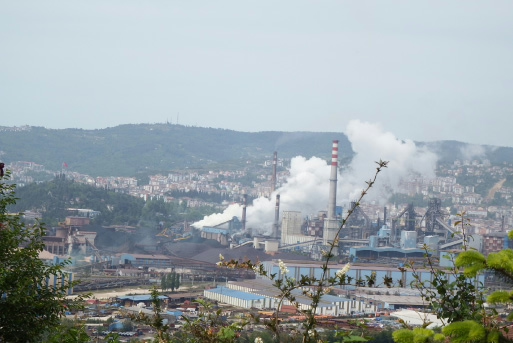The steel industry produces 11% of the annual CO2 emitted globally, contributing significantly to climate change. This is largely due to the reliance on coking coal in primary steel production.
In the UK, Port Talbot and Scunthorpe Steelworks were the second and third biggest single site emitters of carbon. Both sites used blast furnaces – basic oxygen furnaces, with metallurgical coal to make virgin steel. Decarbonisation plans at both steelworks are underway, with government financial support, but so far, a poor deal for workers. Port Talbot and Scunthorpe steelworks will join other smaller UK steel producers in using electric arc furnaces to recycle scrap steel.
All aspects of the steel industry are globalised, including the coking coal inputs, iron ore, scrap steel, and the emissions produced. Solutions to decarbonise steel, therefore, must cross borders with answers needed everywhere—so we should start taking action wherever we are based.


(Türkçe olarak mevcuttur) Coal Action Network investigated the Turkish coal industry in 2024. This article looks at our findings and the links between Turkish coal, air pollution, Russia’s war and decarbonisation.

In Spring 2024, Coal Action Network investigators visited Turkey to see first-hand the impacts that imported coal was having on communities living near steelworks and power stations using coal. At that time, planning permission was in place for West Cumbria Mining Ltd to extract 2.78 million tonnes of coal a year, until 2049, from a coal mine under the sea near Whitehaven, Cumbria, UK.

Former steelworker, Pat Carr, spoke to Anne Harris from Coal Action Network about the financial support offered to workers when the Consett steelworks closed in 1980, and they discussed what can be done better, in workplaces like Scunthorpe steelworks. (Article published in Canary magazine)

Former steelworker, Pat Carr, speaks to Anne Harris from Coal Action Network about the financial support offered to workers when the Consett steelworks closed in 1980.

Port Talbot Steelworks in South Wales is the largest producer of virgin steel in the UK. Along with British Steel steelworks in Scunthorpe, Port Talbot steelworks is expected to shut down its blast furnaces in 2024 and build a 3 million tonne (MT) electric arc furnace (EAF) to recycle scrap steel. This is a measure to reduce the steelworks CO2 footprint by cutting out coal used in traditional blast furnaces in virgin steelmaking.

People hailing from Cumbria to London, and everywhere in between, descended on the Mines and Money Conference in London across two days (28th-29th Nov 2023). We demanded that investors stop pouring cash into the mining sector, and instead invest in our collective future. Together with Fossil Free London and other groups, we greeted investors with…

On 15th September 2023, The Guardian reported that Tata Steel accepted Government funding to avoid closing its steelworks in Port Talbot, South Wales, by decarbonising it instead – but at a loss of up to 3,000 jobs. The UK Government is providing £500 million, and Tata Steel is expected to provide another £725 million…

Update on coal extraction and use in the UK. The situation with coal production and use in the UK is changing. There is a legal challenges to the proposed West Cumbria coal mine and Aberpergwm extension; and an illegal mine operating in Merthyr Tydfil. Updated stats from the government’s July Digest of UK Energy Statistics.

Update on coal extraction and use in the UK. The situation with coal production and use in the UK is changing. There are no new opencast mines proposed; only one proposed opencast coal extension and one existing opencast extraction site…

New report from Coal Action Network. Coal in Steel provides background information to campaigns against proposed new coking coal mines and considering how coal needs to be phased out of steel production.